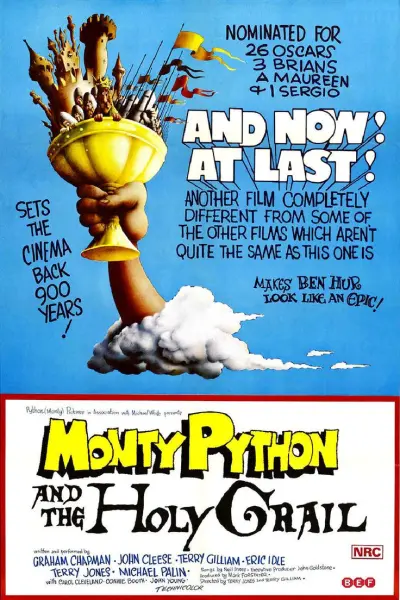
"Monty Python and the Holy Grail," a 1975 British comedy film, stands as a remarkable satire of the Arthurian legend, brilliantly conceptualized by the acclaimed Monty Python comedy group. Directed with flair by Terry Gilliam and Terry Jones, this film is a quintessential parody of the legendary quest for the Holy Grail, ingeniously diverging from the group's earlier sketch-based work. The narrative, set in AD 932, unfolds with King Arthur and his squire, Patsy, embarking on an eccentric journey across Britain to assemble the Knights of the Round Table.
This journey is replete with absurd and surreal events, challenging traditional storytelling norms. The characters encounter a range of preposterous obstacles, from the philosophical musings about swallows carrying coconuts to an encounter with the formidable Black Knight. As Arthur assembles his knights, including Sir Bedevere, Sir Lancelot, Sir Galahad, and Sir Robin, the quest for the Holy Grail takes a series of unexpected, humorous turns.
The film's scenario is ingeniously punctuated with metafictional elements and surreal humor. The knights' separate endeavors in pursuit of the Grail lead them into bizarre situations, including taunting French soldiers, the nonsensical Knights Who Say "Ni!", and the ill-fated Trojan Rabbit plan. The narrative intersects with modern times when a historian documenting Arthurian legends is inexplicably murdered, leading to a police investigation that absurdly intertwines with the medieval quest.
"Monty Python and the Holy Grail" transcends the boundaries of a mere comedic film, offering a subversive critique of historical narratives and legends. It mocks the romanticized notions of medieval chivalry and heroism, presenting a chaotic world where the quest for meaning often yields more questions than answers. The film's abrupt and anticlimactic ending, with Arthur and Bedevere's arrest by contemporary police, further breaks the fourth wall, adding to its unconventional narrative structure.
The film's enduring popularity and its influence, notably inspiring the 2005 Tony Award-winning musical "Spamalot," solidify its unique position in cinematic history. It seamlessly blends satire, comedy, and insightful commentary on the nature of myths and legends, making it a timeless piece in the realm of film.

